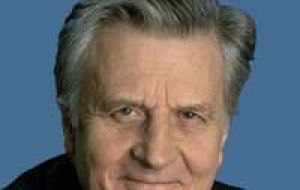MercoPress. South Atlantic News Agency
Euro zone and UK leave interest rates unchanged
 Inflation and recession is Eurozone challenge, said Trichet
Inflation and recession is Eurozone challenge, said Trichet The European Central Bank (ECB) kept interest rates unchanged at 4% on Thursday as concerns about inflation persist. Earlier in London the Bank of England's Monetary Policy Committee adopted a similar decision keeping interest rates on hold at 5.25%.
In his usual press conference following the official announcement ECB president Jean Claude Trichet said that the latest information confirmed the existence of strong short term upward pressure on inflation plus upside risks to price stability over the medium term. Trichet added that although the economic fundamentals of the Euro area "are sound" in a context of very vigorous money and credit growth, "the level of uncertainty resulting from the turmoil in financial markets remains high". In this context and recalling that "maintaining price stability in the medium term" is the ECB primary objective "in accordance with our mandate", Trichet emphasized that the ECB remains "strongly committed to preventing second round effect and the materialization of upside risks to price stability over the medium term". As the US dollar plunges to new record lows the ECB has been under strong pressure from some Euro zone country members (mainly France) and business groups that are demanding a cut in rates to soften credit costs and weaken the Euro thus helping to stoke exports. "The Euro continuing appreciation is becoming alarming" the European Trade Union Confederation warned. The group explained the strong Euro would exacerbate problems already being caused by problems in the world financial markets, slowing global growth and weakening housing markets in a number of key economies. But Trichet and the ECB have argued that in a scenario of "moderating but ongoing real GDP growth" (1.3 to 2.1% in 2008 and 1.3 to 2.3% in 2009), the greatest threat to stability comes from inflation (2.6% to 3.2% in 2008 and between 1.5% and 2.7% in 2009) rather than recession. In London the BoE decision of leaving rates unchanged at 5.25% was in line with analyst and market expectations. The release of minutes of Thursday meeting on March 19 will bring more light on the decision making process. Analysts have highlighted that the bank faces the threat of a slowing economy at a time when inflationary pressures, particularly energy and food, are increasing. In February, the BoE cut rates by a quarter of a percentage point from 5.5%, amid signs of a slowdown. February's interest rate cut was the second lowering of UK rates in three months, with the previous reduction coming in December last year. The price of UK manufacturers' products rose at the fastest pace for more than eight years in February, the Chartered Institute of Purchasing and Supply (CIPS) said this week. The latest official growth figures show that the UK economy grew by 0.6% in the last three months of 2007, but the quarter saw a sharp slowdown in consumer spending. The ECB and BoE decisions will be followed on March 18 by the US Federal Reserve which has lowered rates dramatically from 5.25% last September to 3% with prospects of further reductions as recession gradually sets in.




Top Comments
Disclaimer & comment rulesCommenting for this story is now closed.
If you have a Facebook account, become a fan and comment on our Facebook Page!